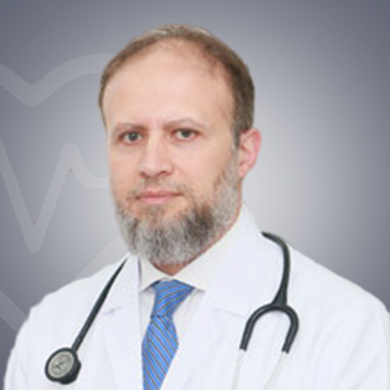
18 Years of experience
Speaks: English
Please find listed below the many conditions that Dr. Mohamed Farouk treats:
It is important to resolve structural heart conditions in a patient and this can be achieved through interventional procedures. These conditions can be easily resolved with the help of modern technology and world class equipments to assist the doctor. A patient focused approach has driven doctors to find solutions such as these which must be followed with quality post procedural care.
Here are the many signs and symptoms present in a patient with the structural or non-coronary cardiovascular diseases:
The most common symptoms seen in people with such heart conditions are chest pain and fatigue. A structural heart issue can lead to high blood pressure for prolonged periods of time. Kidney dysfunction is also the result of lingering structural heart issues in a patient.
It is from Monday to Saturday, 10 am to 7 pm that the doctor operates. The patient reviews of the doctor make it clear that this is a skillful and efficient interventional cardiologist.`
The popular interventional cardiology procedures performed by Dr. Mohamed Farouk are as follows:
For a long time now, interventional cardiologists have used techniques such as placement of stent, angioplasty and atherectomy to open blocked arteries. The procedure to insert defibrillators and pacemakers to correct abnormal heart rhythms is also regularly performed.

Share Your Experience about Dr. Mohamed Farouk

The interventional cardiologist either performs or prescribes you to get diagnostic and screening tests to find the reasons behind your prevailing heart issue. A1L1_FAQ_Interventional_Cardiologist Even in case of emergency heart situations such as a heart attack, you can go to this doctor. Any distress or discomfort which indicates a heart condition must be dealt with immediately by consulting the doctor.
Here is the list of tests required before and during consultation for an Interventional Cardiologist:
It is important to get the tests done so that the doctor can decide upon the right treatment for you. The blood vessel and heart health become apparent after the test results come in.
In order to keep your heart healthy, you must exercise, eat well and keep a balanced lifestyle. Cardiovascular issues or structural defects in your heart can be treated with interventional cardiology techniques. Some heart conditions are treated by interventional cardiologists by non surgical procedures which are base d on using the catheter. If on your visit to the cardiologist you realise that the dietary and lifestyle changes are not enough they may refer you to this doctor.